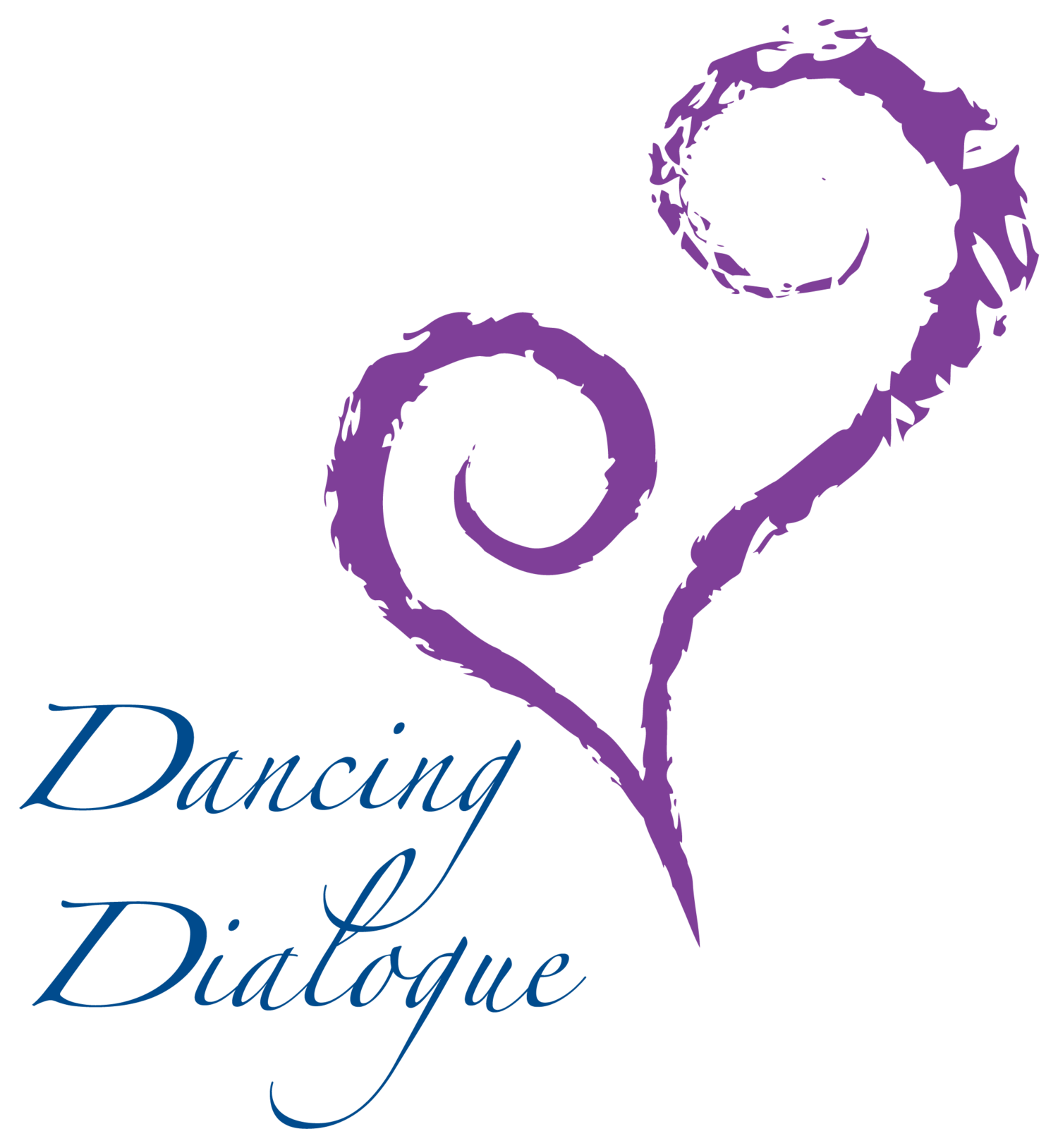
American Art Therapy Association | Re-Envisioning Art Therapy: Shifting From Scarcity and Struggle to Community and Abundance (Miami)
Re-Envisioning Art Therapy: Shifting From Scarcity and Struggle to Community and Abundance
Kelley Linhardt, MA, ATR-BC, LCAT, Kate McIntosh, MA, ATR-BC
Location: Orchid A/B
Edith Kramer advised new graduates to work three days a week but, for most, full time work plus additional hours to obtain credentials and make a living wage is necessary. This focus group will work to re-envision the profession to prioritize abundance, community and creativity and deemphasize scarcity, overwork, and burnout. Melissa Kate McIntosh trained as an art therapist at Pratt Institute and depth psychology at Pacifica Graduate Institute. She currently has a thriving private practice as a licensed creative arts therapist in Manhattan while completing post-doctoral training for licensure for clinical psychology.

American Dance Therapy Association | Expression of the Dying Trace-form Between Patient and Dance/Movement Therapist (Salt Lake City)
Expression of the Dying Trace-form Between Patient and Dance/Movement Therapist
Jennifer Whitley presents dance/movement therapy design and approaches to End of Life work.

American Dance Therapy Association | Dancing Together Around the World from Home: How Online Learning, Observing & Dancing Works (Salt Lake City)
Dancing Together Around the World from Home: How Online Learning, Observing & Dancing Works
Dr Suzi Tortora, Candy Beers-Kim, Karen Bradley, Zita Gil, Jennifer Ellyson, Ilse DeKoeyer-Laros, Barbara Nordstrom- Loeb, Krestin Radonovich, Jennifer Whitley present "Dancing Together Around the World from Home: How Online Learning, Observing & Dancing Works"

American Dance Therapy Association | LMA in Practice: Frameworks to support the creative process – integrating art, science and culture (Salt Lake City)
LMA in Practice: Frameworks to support the creative process – integrating art, science and culture
Dr. Suzi Tortora, Katya Bloom, Nancy Beardall, Jane Wilson Cathcart, and Jessica Young present "LMA in Practice: Frameworks to support the creative process – integrating art, science and culture"

American Dance Therapy Association | Dancing Through the Ages: How Our Early Nonverbal Attachment and Experiences Shape Who We Become (Salt Lake City)
Dr. Suzi Tortora presents "Dancing Through the Ages: How Our Early Nonverbal Attachment and Experiences Shape Who We Become"
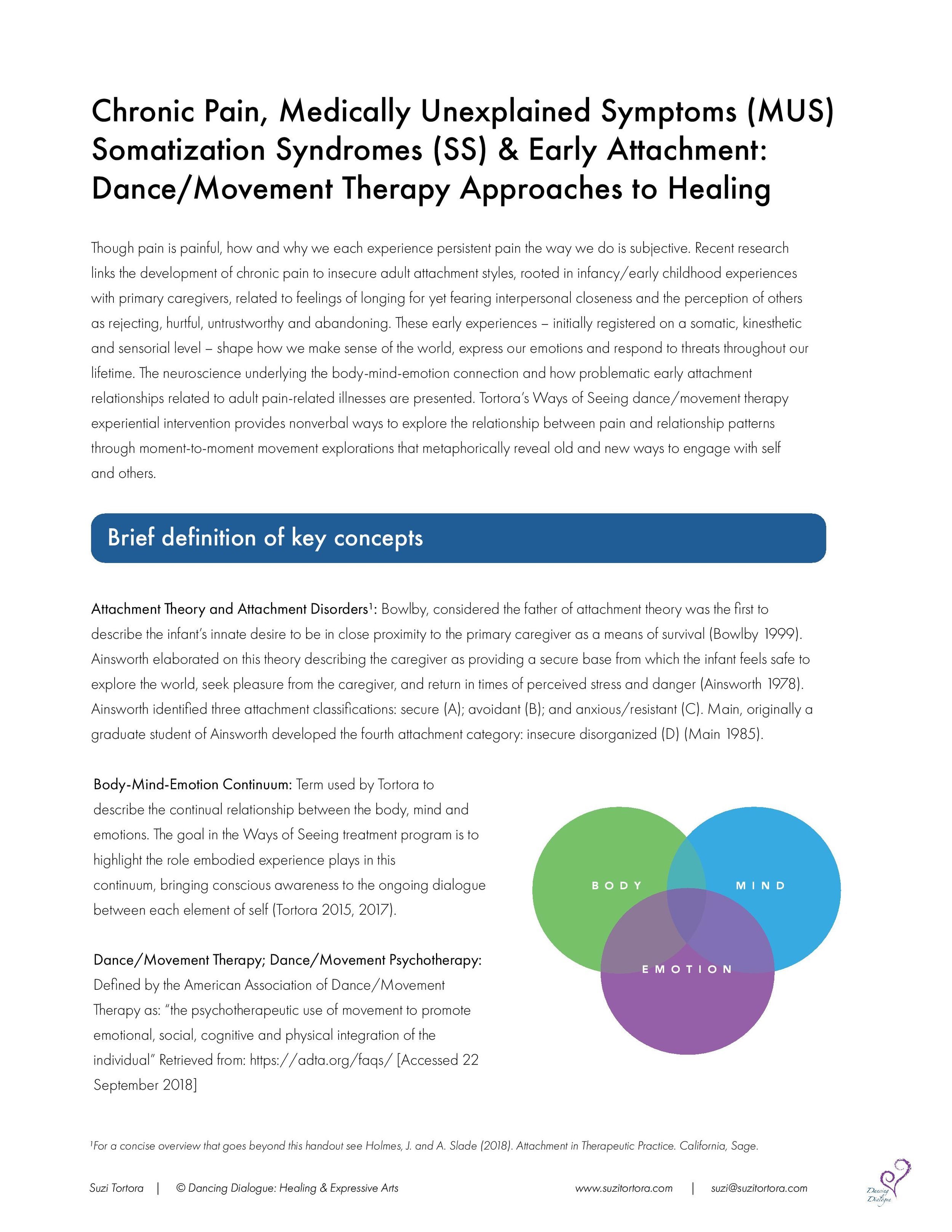
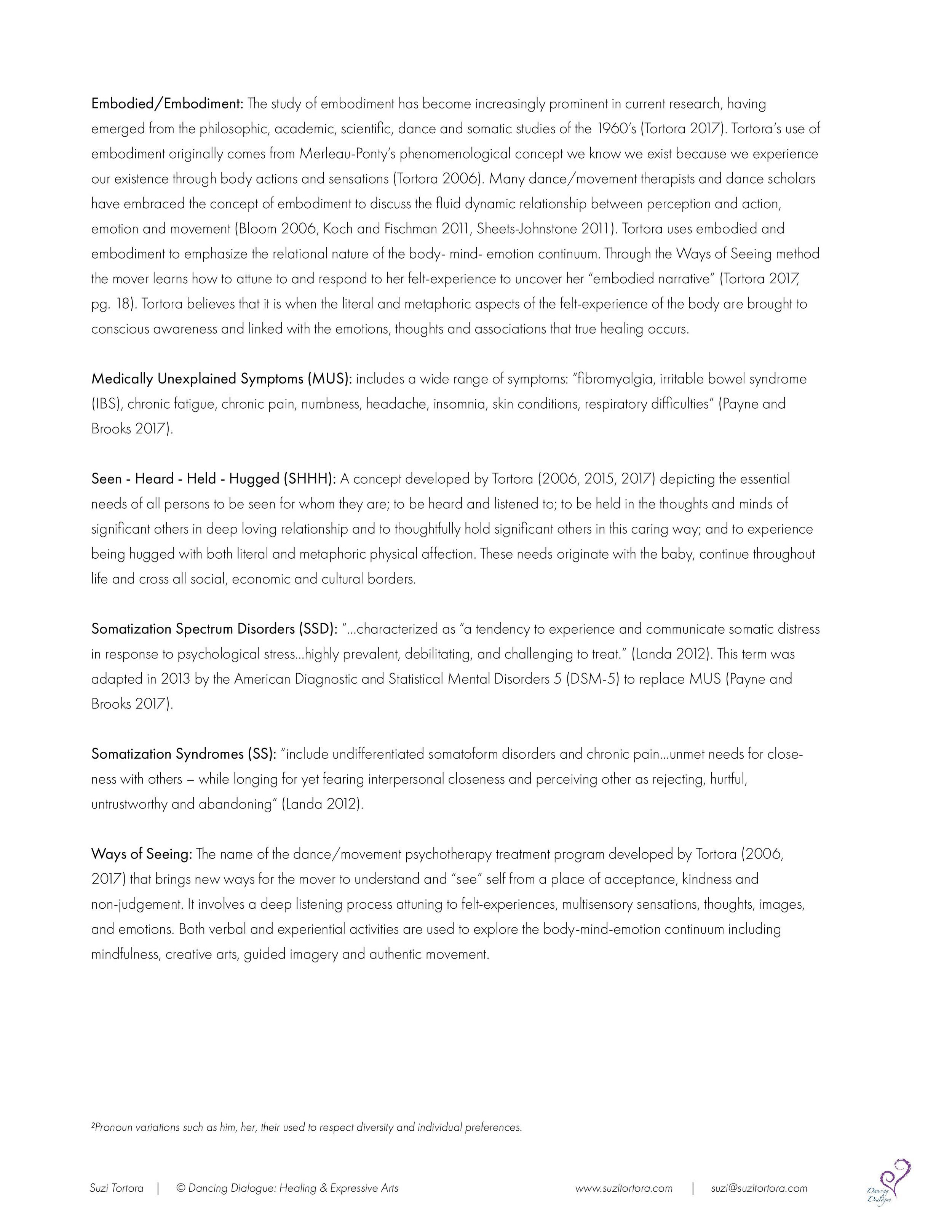
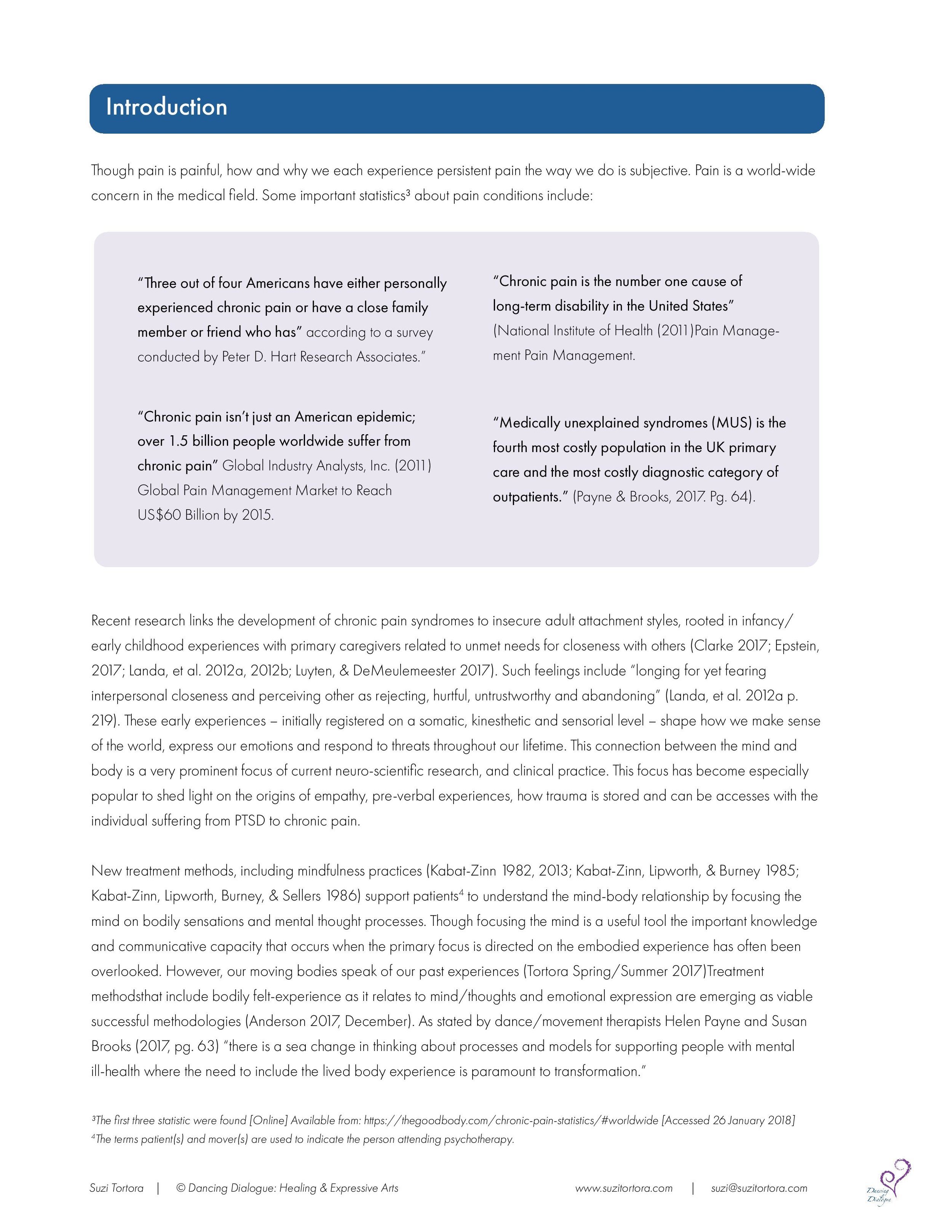
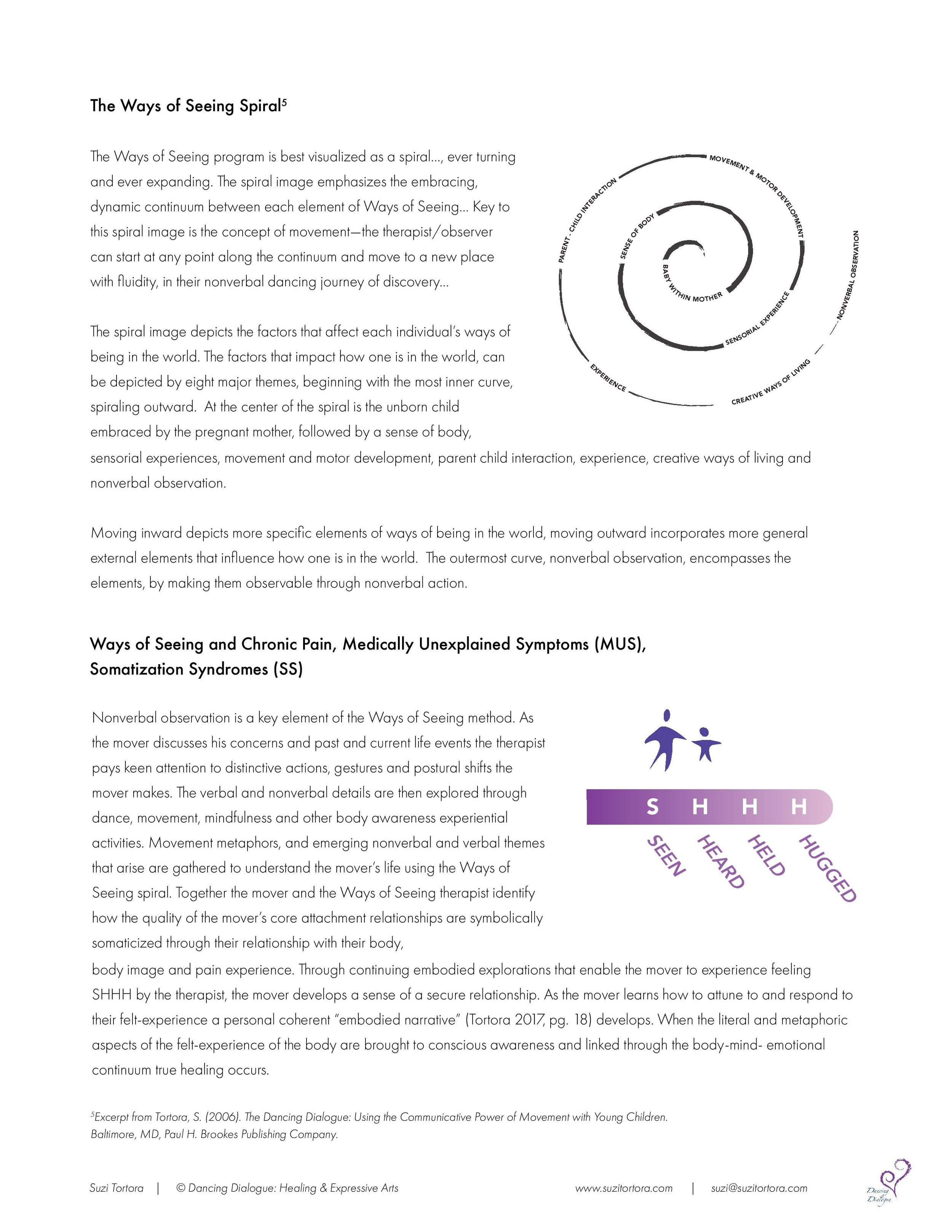
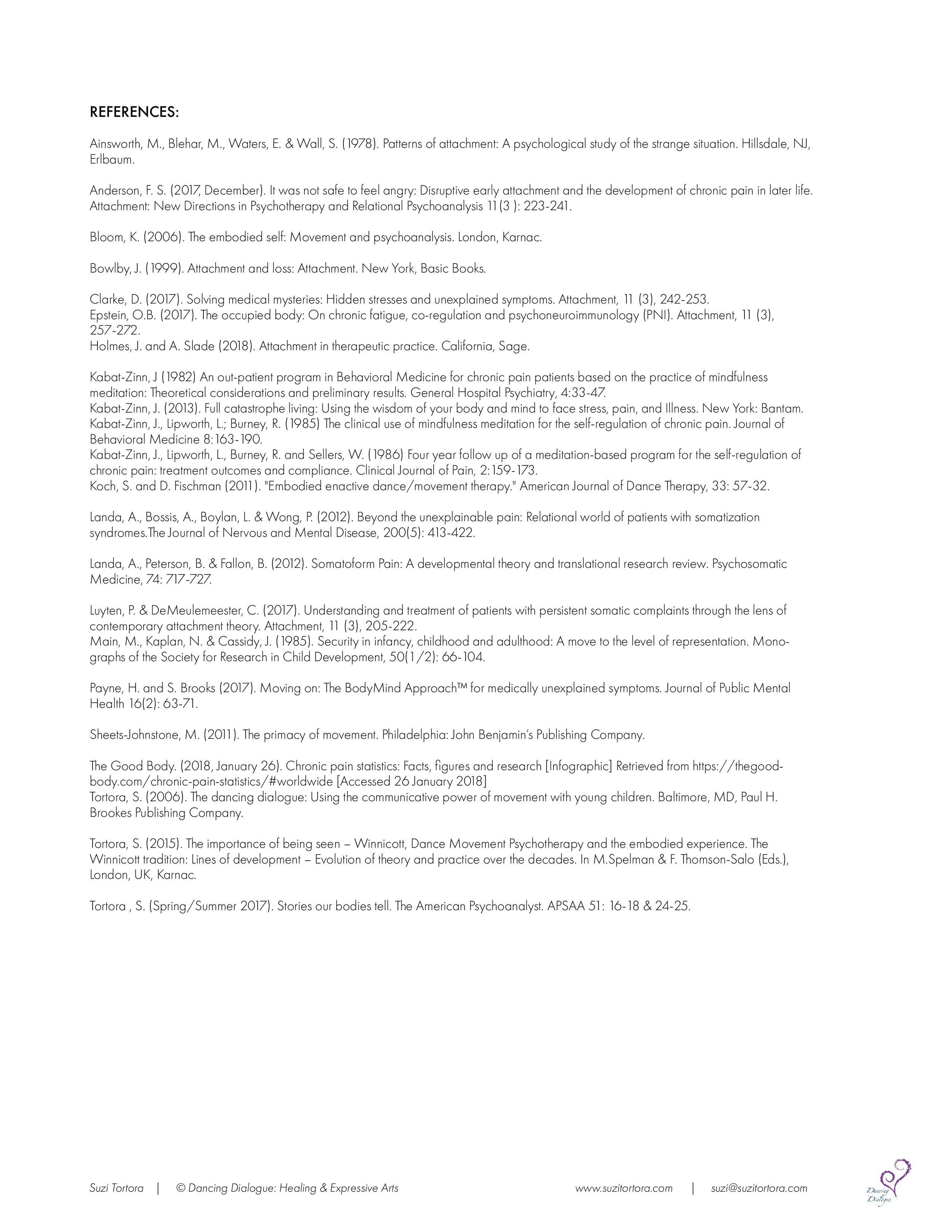
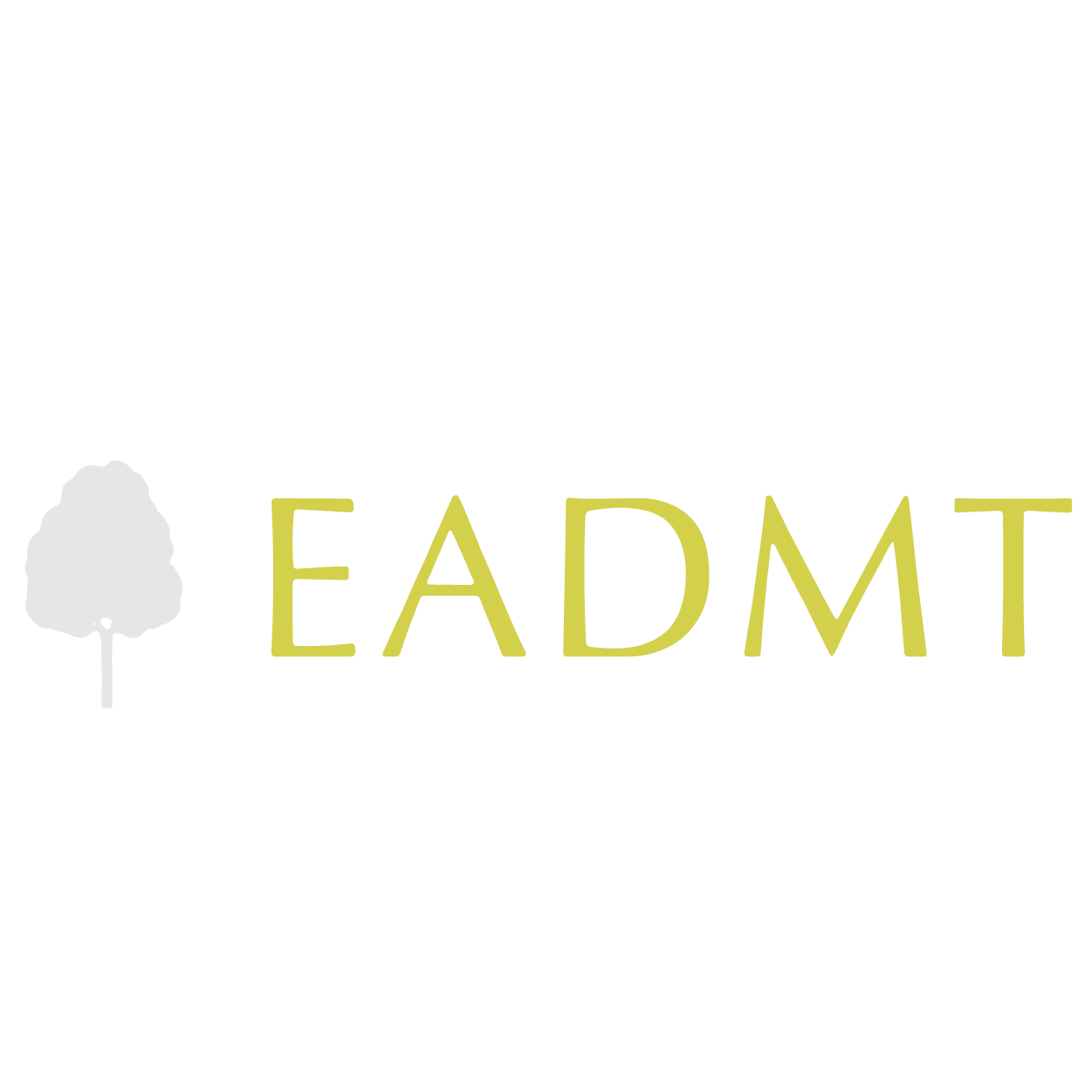
3rd European Association of Dance Movement Therapy (EADMT) Conference | The Body and Digital Use of Technology Panel (Athens, Greece)
Body and Digital Technology Panel: The Body and Digital use of technology for DMT training, therapeutic practice, body movement movement practices such as authentic movement, presentations (apps, webi-nairs, etc.)
Location: Atrium
Chairperson: Marcia Plevin ( Italy)
Members of the Panel: Eila Goldhahn (UK) Julia Markarova ( Nether- lands, Russia) Suzi Tortora ( USA) online: Eleni Sokolova (Russia), T. Zhou ( China/Netherlands)

3rd European Association of Dance Movement Therapy (EADMT) Conference | Chronic Pain, Medically Unexplained Symptoms (MUS)/ Somatization Syndromes (SS) & Early Attachment (Athens, Greece)
Chronic Pain, Medically Unexplained Symptoms (MUS)/ Somatization Syndromes (SS) & Early Attachment: Dance/Movement Therapy Approaches to Healing.
Location: Museum
Dr. Suzi Tortora presents "Chronic Pain, Medically Unexplained Symptoms (MUS)/ Somatization Syndromes (SS) & Early Attachment: Dance/Movement Therapy Approaches to Healing."






3rd European Association of Dance Movement Therapy (EADMT) Conference | Dancing Together Around the World from Home: How Learning, Observing & Dancing Through Cyberspace Works for DMT (Athens, Greece)
Dancing Together Around the World from Home: How Learning, Observing & Dancing Through Cyberspace Works for DMT.
Location: Workshop Space
Room SILK C
Dr. Suzi Tortora presents with students Fabiana Dos Reis Marchiori, Izabela Guzek, Jessica Heuvels, Neva Kralj, Alenka LinVrbančič Simonič, Jennifer Whitley, Emma Gran, Elli Kita and Ruby Worth

Codart University for the Arts | Masters in Dance Therapy | Families in Motion (Rotterdam, Netherlands)
Families in Motion: The Dancing Dialogue- Using the Power of Movement to Support Communication and Attachment with Infants, Young Children, and Families using Ways of Seeing, at Codart University for the Arts, Masters in Dance Therapy. Director: Nicki Wentholt. Rotterdam, Netherlands.
LIMS 40th Anniversary Conference 2018 | When and How Do We Use LMA in Dance/Movement Therapy Clinical Practice? (New York City)
Ways of Seeing: A LMA/BF based DMT program
Suzi Tortora, Director/Founder: Dancing Dialogue LCAT LMHC PLLC
Karen Bradley, President Laban/Bartenieff Institute of Movement Studies CMA
When And How Do We Use LMA
Panel Discussion
When and How Do We Use LMA in Dance/Movement Therapy Clinical Practice?
Panel members will share their individual thoughts as to how LMA has been influential in their DMT clinical practices, citing a specific clinical example of when and how a particular aspect of LMA was of pivotal importance in their work. The aim is to reflect on which elements of the LMA frameworks have proved most insightful for clinical practice.
Panelists
Nancy Beardall PhD, BC-DMT, LMHC, CMA
Katya Bloom PhD, BC-DMT, CMA
Jane Wilson Cathcart LCSW-R, BC-DMT, CMA
Suzi Tortora, Ed.D., LCAT, LMHC, NCC, CMA, KMP

The World Association of Infant Mental Health | Navigating the Nature Nurture Paradigm Using Dance, Music, and Play to Build the Attachment Relationship in a Five-Year Triadic Treatment (Rome, Italy)
Presented with Miri Keren, MD.
“From Dissonance to Dancing Dialogue: Navigating the Nature Nurture Paradigm Using Dance, Music, and Play to Build the Attachment Relationship in a Five-Year Triadic Treatment”
Miri Keren (Israel) reflects in her speech “The concept of Co-Parenthood Constellation as the basis of the triadic father-infant-mother psychotherapy” the father's significance in PIP. It turned out that new fathers develop a Primary Paternal Preoccupation as well as new mothers do. A case vignette will illustrate how, in the triadic interaction, the infant meets the expression of an internalized mental representation of each parent's own co-parenting experiences he/she has lived in their childhood. Elizabeth Tuters (Toronto) is concerned with the questions how do we as psychoanalysts and psychotherapists approach the problems parents present to us with their infants and young children? How do we begin to unpack the symptoms and gather information to help formulate the issues? In her model “Observation, Understanding, Reflection (OUR)” she shows how with the use of a psychoanalytic lens, which values being attentive to our own internal states in contact with the impact of the primitive emotional states within parent-infant/child relationships. Women who became pregnant during their psychoanalysis or who started being pregnant with psychotherapy sometimes need PIP after birth. Christiane Ludwig-Körner (Berlin) deals in her contribution “Methodological considerations regarding parent-infant psychotherapy” how this setting change can succeed.
Zero to Three | Building Resilience in Young Children and their Families: Body-Mind Approaches (New York City)
How the body speaks: The Nonverbal cues of trauma between Mother and Baby
Speakers:
Suzi Tortora, Ed.D., BC-DMT, LCAT, LMHC
Daniel Schechter, M.D., Habil., DFAACAP
The Moving Child
Speaker: Suzi Tortora, Ed.D., BC-DMT, LCAT, LMHC
Co-sponsored by Bank Street and the Ackerman Institute for the Family

Children's Hospital of Philadelphia | Following their Lead: Medical Dance Therapy for Infants, Children and Their Families (Philadelphia)
Dr. Suzi will be presenting together with Jennifer Whitley at the Pediatric Medical Creative Arts Therapy Conference which will be held:
Friday, April 20, 2018, from 9 a.m. to 4 p.m.
Saturday, April 21, from 9 a.m. to noon
She will be presenting on:
Saturday, April 21st from 9:45am to 10:45am

Autism Treatment & Research Center | The parental protective shield as the focus of therapeutic work with high risk children (Tel Aviv, Israel)
Autism Treatment & Research Center is pleased to invite you to the conference:
"The parental protective shield as the focus of therapeutic work with high risk children"
Guest lecturer: Dr. Suzi Tortora, New-York
Ed.D, DC-DMT, CMA, LCAT
Program
08:30 – 09:00
Gathering
09:00 – 09:15
Greetings and introduction, Mrs. Nilly Aronson, MA, Clinical psychologist, Professional manager of Autism in the Autism Treatment & Research Center
09:15 – 11:15
"The Dancing Dialogue" – The body movement and non-verbal communication – Demonstration of work with Autistic children and their parents – Dr. Suzi Tortora
11:15 – 11:45
Coffee break
11:45 – 12:40
Presentation of a video recorded intake – Mrs. Inbar Riklis
Discussion: Using the DC 0-5 guide to a multi-dimensional understanding of the infants symptom", Dr. Miri Keren
12:40 – 13:30
Interactions from the treatment room, Mrs. Mervat Omri
Discussion, Dr. Suzi Tortora
13:30 – 14:00
Lunch break
14:00 – 14:50
Case study – Mrs. Orly Shalev
Discussion- "In the name of love – fantasy, reality and impairment in the relationship between parents and a child with a development problem, Dr. Netta Gutman Avner
14:50 – 15:00
Closure, Mrs. Nilly Aronson
Dr. Netta Gutman Avner
Child and adolescent psychologist, psychoanalyst. Founder and manager of the mother and child clinic, the psychiatric service, health center, Tel-aviv.
Dr. Miri Keren
Child and adolescent psychiatrist, chief of the mental health unit for infants, Geha Health Center Clalit Health Services, senior lecturer in the Tel Aviv Medical School, head of the course of psychology of infancy in the Continuing Education Program of the Tel Aviv university; Former President of the international infants, mental health society; Member of the DC 0-5 writing team.
Mrs. Orly Shalev (MA)
Dance and movement therapist, Psychotherapist. Therapist and vice manager of the Holon unit in the Autism Treatment & Research Center. Private clinic.
Mrs. Mervat Omri (MA)
Dance and movement therapist, Therapist and clinical manager of kindergarten, the North Hasharon unit within the Autism Treatment & Research Center.
Mrs. Inbar Riklis (MA)
Dance and movement therapist, graduate of the Music and Dance Academy in Jerusalem. A Therapist and clinical manager of Hasharon Unit, The Autism Treatment & Research Center.
Mrs. Nilly Aronson (MA)
Clinical psychologist. Professional Manager of Autism in the Autism Treatment & Research Center. Head of the internship program of clinical psychology within the Center for research and treatment of Autism. Tutoring students in psychotherapy advanced program, Tel Aviv University.

The Israeli Association For Infant Mental Health | Understanding baby’s embodied experience to promote social-emotional developments (Israel)
Dr. Suzi Tortora: Communicating without words
It is not just what you say but how you say it - with your body - that counts. We communicate with babies, and each other, before we even say a word. Babies also talk to us right from the beginning through their facial expressions, body actions, the quality of their vocalizations and even the way they look at us. This embodied experiential nature of our interactions can be used to understand the underlying meaning of an infant and young child’s behaviors as well as build emotional expression, social engagement and strengthen the attachment relationship.
This talk will demonstrate how dance, movement, music and rhythmic activities can be used to support and treat early relationship difficulties through a nonverbal lens. Participants will be introduced to a nonverbal analysis tool that can be used for clinical observation; assessment; and video-feedback parenting-infant education and intervention.
Learning objectives:
Understand the role of embodied, multisensory, and preverbal experience in early infancy and childhood emotional/social development.
Understand the role of nonverbal analysis for assessment and clinical intervention with infants, young children and their caregivers.
Winnicott to neuroscience: learn how object relations theory and current neuroscience research provide a foundation for creative and movement-based interventions.
Learn how creative, multimodal and interactive explorations using dance, movement, dance-play, music and nonverbal expression are used to facilitate psychobehavioral change to treat early relationship difficulties.

The Israeli Association of Creative & Expressive Therapies | Trauma, stress and postpartum depression: Video-analysis and DMT treatment of a parent-infant attachment relationship (Israel)
Hosting Dr. Suzi Tortora
Sunday March 25th
Seminar Hakibutzim
Dr. Tortora is a licensed creative arts therapist and board certified dance/movement therapist with her doctorate from Teacher’s College, Columbia University. She serves as consultant to the “Mothers, Infants and Young Children of September 11, 2001: A Primary Prevention Project” in the Department of Psychiatry, Columbia University under Dr. Beatrice Beebe. She has a full-time private practice in Cold Spring, NY and NYC for over 30 years, specializing in parent- infant/child and family therapy; trauma; pediatric medical illness; and adult chronic pain. Dr. Tortora teaches in Europe, South America, New Zealand, the Middle East and Asia and holds faculty positions in the USA, The Netherlands, Chech Republic, Argentina and China. She also offers international webinar-based Ways of Seeing training programs for dance/movement therapists and allied professionals. She has published numerous papers about her work and her book, The Dancing Dialogue: Using the communicative power of movement with young children is used extensively in dance/movement therapy training programs around the world.
Program
9:15-9:45
Gathering and registration
9:45-10:00
Introductory comments
10:00-11:30
Keynote lecture by Dr. Tortora, “Ways of seeing”: Theoretical-research based focus on embodied countertransference and tools for nonverbal observation.
11:30-11:45
Coffee Break
11:45-13:15
Experiential session based on a case-study presentation in the context of the “Ways of Seeing” method.
13:15-14:00
Lunch Break
14:00-15:30
Smadar Korn: “Dyadic (parent-child) treatment in the dance/movement therapy room -- what is its uniqueness?”
Discussant: Dr Tortora
15:30-15:45
Concluding comments
Smadar Korn, MA, Dance and Movement therapist, psychotherapist, and supervisor. In the course of her career as a therapist, lecturer and supervisor, she has taught dyadic therapy, bodymind, creative-expressive processes in supervision and authentic movement.

Programa de Entrenamiento en Danza Movimiento Terapia | Supervision Classes (Buenos Aires, Argentina)
Lecture series and supervision at Programa de Entrenamiento en Danza Movimiento Terapia de Buenos Aires - Brecha - Buenos Aires Dance Movement Therapy Training Program
February 22 - 25, 2018
Dance Movement Therapy with Children.
Intensive Week: Dancing Dialogue. Dr. Suzi Tortora BC-DMT
dra.dianafischman@gmail.com
www.brecha.com.ar
Te: (5411) 4542-4623/4857
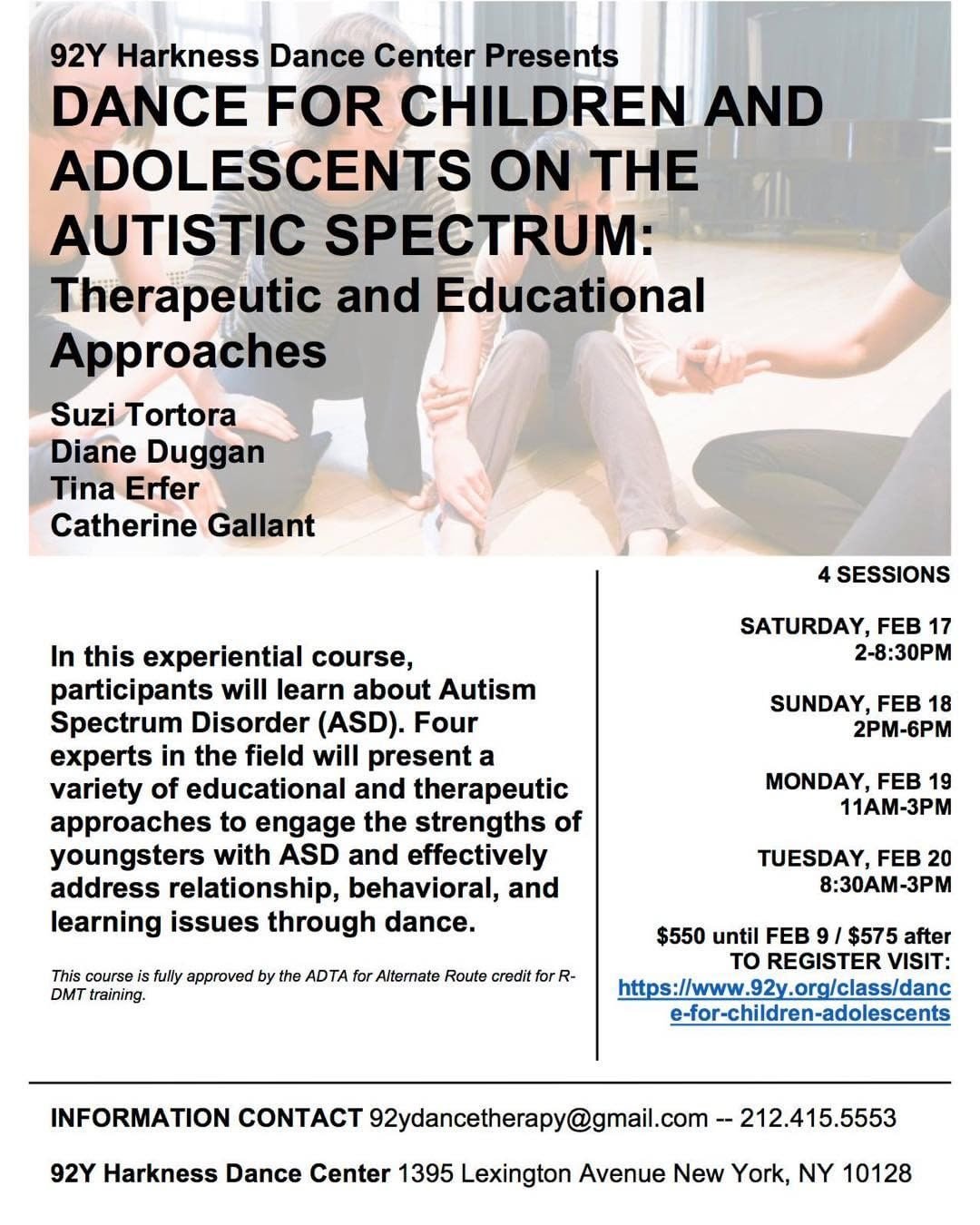
92Y Harkness Dance Center | Dance For Children And Adolescents On The Autistic Spectrum: Therapeutic And Educational Approaches (New York)
Intensive: Dance for Children and Adolescents on the Autistic Spectrum — Therapeutic and Educational Approaches
Dr. Diane Duggan, Tina Erfer, Catherine Gallant and Dr. Suzi Tortora
In this experiential DEL course, participants will learn about characteristics and identification of autism spectrum disorder (ASD).
Four experts in the field will present a variety of educational and therapeutic approaches to engage the strengths of youngsters with ASD and effectively address relationship, behavioral and learning issues through dance.
$375 until Feb 9 / $400 after

92Y Harkness Dance Center | Intensive: Dance/Movement Psychotherapy with Infants and Children (New York, NY)
Sensitize yourself to the ways young children learn and express themselves through their movement and senses.
Explore nonverbal cues and movement activities that support early attachment relationships and social, emotional and cognitive development. For parents, caregivers and professionals, these activities are used with families or groups and in dyadic or individual therapeutic, hospital, preventative and child-care settings.

92Y Harkness Dance Center | Intensive: Dance/Movement Psychotherapy with Infants and Children (New York, NY)
Sensitize yourself to the ways young children learn and express themselves through their movement and senses.
Explore nonverbal cues and movement activities that support early attachment relationships and social, emotional and cognitive development. For parents, caregivers and professionals, these activities are used with families or groups and in dyadic or individual therapeutic, hospital, preventative and child-care settings.
